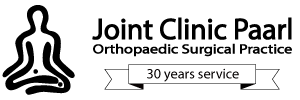Your first visit
Lorem ipsum dolor sit amet, consectetur adipiscing elit. Ut elit tellus, luctus nec ullamcorper mattis, pulvinar dapibus leo.
Your first visit
Herewith a broad overview of what to bring and expect on your first visit to Joint Clinic Paarl.
1. Make an appointment
To schedule an appointment, please call +27 (21) 872 3026, make an appointment at our consulting rooms or complete the form below to make an online appointment request.
2. Bring the following items
- Your Dermographic data
- Referral letter
- Medical aid card
- List of current medication and dosage
- Consulting reports of previous illnesses/hospitalisation
- Laboratory results
- Available x-rays
3. Medical history
We go over your medical history, covering the following topics:
- Main complaint
- Discuss the expectations and goals of the patient
- Medical history
- Surgical history
- Allergies
- Personal history
4. Medical examination
We perform a physical examination pertaining to your problem area:
- Hip; knee; ankle; foot
- Shoulder; elbow; wrist; hand
- Neck; middle back; lower back
- General physical examination
- Special tests
5. Bedside tests
We perform the following bedside tests:
- BP
- Pulse
- Respiratory rate
- Temperature
- Urine analysis
- Blood sugar
6. Special Tests
We peform the following special tests as needed:
X-rays
- Plain X-rays
- Ultra Sound
- CT Scan
- MRI scan
Laboratory tests
- Chemistry
- Haematology
- Endocrine metabolic
- Tumor markers
- Genetic tests
- Allergy tests
- Immunology tests
- Medication tests
- Micro biology tests
- ECG and EEG
- Isotopes studies
7. Differential / Preliminary diagnosis
- Osteoarthritis
- Gout
- Pseudogout
- Rheumatoid arthritis
- Sero-negative arthritis
- Osteopenia
8. Final Diagnosis
9. Concomitant diseases
- Cardiopathy
- Hypertension
- Abnormal rhythm
- Valve lesions
- Heart muscle disease
- Chronic lung disease
- Chronic kidney disease
- Liver disease
- Diabetus mellitus
- Patient who smokes
- Excessive use of alcohol
- Anaemic/blood disease
- Peripheral vascular disease
- Neoplasia/cancer
- Sleep apnoea
10. Treatment Plan
1. Conservative treatment:
- Rest and observation
- Adjustment to activities
- Improved nutritional status – Dietitian
- Therapy
- Physiotherapy
- Occupational therapy
- Speech therapist
- Psychotherapist
- Chiropractor
- Prosthesis / orthosis
- Exercise therapy
- Water therapy
2. Surgical treatment types:
- Open/buttonhole surgery
- Manual surgery
- Computer assisted surgery
- Robotic surgery
3. Indications:
- Pain
- Stiffness
- deformity
- Abnormal gait
- Loss of function
4. Contraindications:
- Infection
- Poor circulation
- Abnormal skin
- Osteoporosis
- Untreated underlying disease
- Insufficiently treated disease
- Bad structural disease
- High thrombosis risk
- Anemia
- Problematic physic disease
- High age
5. Alternative Treatment:
- Conservative treatment
- Surgical treatment
6. Risks and possible complications:
- General complications
- Specific complications
- Infection
- Stiffness
- Continuous pain
- Bone length difference
- Dislocation
- Blood clot
- Fracture
- Blood transfusion
- Bleeding and hematoma
- Nerve damage
- Blood vessel damage
- Oppression
- Wear and Tear
7. Choice of technique:
- Access
- Type of prosthesis/components
- Wound closure
8. Conclude contract with patient iro:
- Preparation
- Exercises
- House inspection
- Risks
- Finalise and sign the informative permission form
Conclusion of the planning
If there are any concerns in the last five (5) days before the operation (such as colds, flu, fever or skin lesions), please contact our office as soon as the operation may need to be postponed.
We will schedule the operation (place / day / date / time) but cannot guarantee that it will work out that way.You are encouraged to follow a wellness and weight loss program. We will communicate with your GP. Your family is welcome to contact us.

